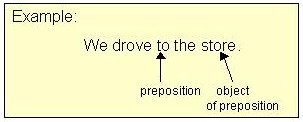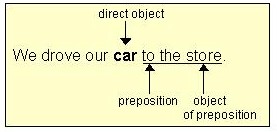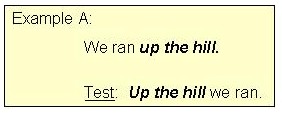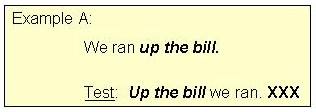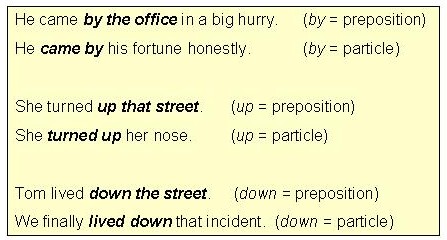| Admissions | Contact Us | Examinations | Grants | Instructors | Lecture | Membership | Students login | Schools | Colleges | Universities | Professional Examinations | Recommendations | Research Grants | Search | Librarians | Forms | Booksellers | Continents/States/Districts | Contracts | Volunteer |
| What is a preposition? |
| What are various examples of prepositions? |
|
Where do you use word to in a sentence? The word to is a preposition. What words are similar to the word to? Where do you use the word of in a sentence? What words are similar to the word of? How do you place an adjective or an adverb in a sentence? If the countable noun is specific, definite can be preceded by the. The book has been printed. A book has been read. Ten books have been printed. What is a preposition? Prepositions are used before nouns to give additional information in a sentence. Usually, prepositions are used to show where something is located or when something happened. A preposition links nouns, pronouns and phrases to other words in a sentence. The word or phrase that the preposition introduces is called the object of the preposition. Prepositions are the words that indicate location. A preposition usually indicates the temporal, spatial or logical relationship of its object to the rest of the sentence as in the following examples: The book is on the table. The book is beneath the table. The book is leaning against the table. The book is beside the table. She held the book over the table. She read the book during class. In each of the preceding sentences, a preposition locates the noun "book" in space or in time. A prepositional phrase is made up of the preposition, its object and any associated adjectives or adverbs. A prepositional phrase can function as a noun, an adjective, or an adverb. The most common prepositions are "about," "above," "across," "after," "against," "along," "among," "around," "at," "before," "behind," "below," "beneath," "beside," "between," "beyond," "but," "by," "despite," "down," "during," "except," "for," "from," "in," "inside," "into," "like," "near," "of," "off," "on," "onto," "out," "outside," "over," "past," "since," "through," "throughout," "till," "to," "toward," "under," "underneath," "until," "up," "upon," "with," "within," and "without." |
|
Prepositions of Place Prepositions of Time English Grammar : Prepositions : English Preposition Rule Rule A preposition is followed by a "noun". It is never followed by a verb. Why is the word "to" followed by a verb in these sentences: I would like to go now; she used to smoke, as a preposition is followed by a "noun" but never by a verb? In these sentences, "to" is not a preposition. It is part of the infinitive: to go, to smoke. By "noun" we include:
A preposition cannot be followed by a verb. If we want to follow a preposition by a verb, we must use the "-ing" form which is really a gerund or verb in noun form. Quick Quiz: In the following sentences, why is "to" followed by a verb? That should be impossible, according to the above rule:
Here are some examples:
|
|
Prepositions: Locators in Time and Place A preposition describes a relationship between other words in a sentence. In itself, a word like "in" or "after" is rather meaningless and hard to define in mere words. For instance, when you do try to define a preposition like "in" or "between" or "on," you invariably use your hands to show how something is situated in relationship to something else. Prepositions are nearly always combined with other words in structures called prepositional phrases. Prepositional phrases can be made up of a million different words, but they tend to be built the same: a preposition followed by a determiner and an adjective or two, followed by a pronoun or noun (called the object of the preposition). This whole phrase, in turn, takes on a modifying role, acting as an adjective or an adverb, locating something in time and space, modifying a noun, or telling when or where or under what conditions something happened. Consider the professor's desk and all the prepositional phrases we can use while talking about it. You can sit before the desk (or in front of the desk). The professor can sit on the desk (when he's being informal) or behind the desk, and then his feet are under the desk or beneath the desk. He can stand beside the desk (meaning next to the desk), before the desk, between the desk and you, or even on the desk (if he's really strange). If he's clumsy, he can bump into the desk or try to walk through the desk (and stuff would fall off the desk). Passing his hands over the desk or resting his elbows upon the desk, he often looks across the desk and speaks of the desk or concerning the desk as if there were nothing else like the desk. Because he thinks of nothing except the desk, sometimes you wonder about the desk, what's in the desk, what he paid for the desk, and if he could live without the desk. You can walk toward the desk, to the desk, around the desk, by the desk, and even past the desk while he sits at the desk or leans against the desk. Those words in bold blue font are all prepositions. Some prepositions do other things besides locate in space or time — "My brother is like my father." "Everyone in the class except me got the answer." — but nearly all of them modify in one way or another. It is possible for a preposition phrase to act as a noun — "During a church service is not a good time to discuss picnic plans" or "In the South Pacific is where I long to be" — but this is seldom appropriate in formal or academic writing. Click HERE for a list of common prepositions that will be easy to print out.
Is it any wonder that prepositions create such troubles for students for whom English is a second language? We say we are at the hospital to visit a friend who is in the hospital. We lie in bed but on the couch. We watch a film at the theater but on television. For native speakers, these little words present little difficulty, but try to learn another language, any other language, and you will quickly discover that prepositions are troublesome wherever you live and learn. This page contains some interesting (sometimes troublesome) prepositions with brief usage notes. To address all the potential difficulties with prepositions in idiomatic usage would require volumes, and the only way English language learners can begin to master the intricacies of preposition usage is through practice and paying close attention to speech and the written word. Keeping a good dictionary close at hand (to hand?) is an important first step. Prepositions of Time: at, on, and inWe use at to designate specific times. We use on to designate days and dates. We use in for nonspecific times during a day, a month, a season, or a year. Prepositions of Place: at, on, and inWe use at for specific addresses. We use on to designate names of streets, avenues, etc. And we use in for the names of land-areas (towns, counties, states, countries, and continents).
Prepositions of Movement: to
| ||||||||||||||||||||||||||||||||||||||||||||||||||||||||||||||||||||||||||||||||||||||||||||||||||||||||||||||||||||||||||||||||||||||||||||||||||||||||||
NOUNS and PREPOSITIONS |
||
|
approval of |
fondness for |
need for |
ADJECTIVES and PREPOSITIONS | ||
|
afraid of |
fond of |
proud of |
VERBS and PREPOSITIONS | ||
|
apologize for |
give up |
prepare for |
A combination of verb and preposition is called a phrasal verb. The word that is joined to the verb is then called a particle. Please refer to the brief section we have prepared on phrasal verbs for an explanation.
Idiomatic Expressions with Prepositions
- agree to a proposal, with a person, on a price, in principle
- argue about a matter, with a person, for or against a proposition
- compare to to show likenesses, with to show differences (sometimes similarities)
- correspond to a thing, with a person
- differ from an unlike thing, with a person
- live at an address, in a house or city, on a street, with other people
Unnecessary Prepositions
In everyday speech, we fall into some bad habits, using prepositions where they are not necessary. It would be a good idea to eliminate these words altogether, but we must be especially careful not to use them in formal, academic prose.
- She met
up withthe new coach in the hallway. - The book fell off
ofthe desk. - He threw the book out
ofthe window. - She wouldn't let the cat inside
ofthe house. [or use "in"] - Where did they go
to? - Put the lamp in back of the couch. [use "behind" instead]
- Where is your college
at?
A preposition usually indicates the temporal, spatial or logical relationship of its object to the rest of the sentence.
The most common prepositions: "about, above, across, after, against, along, among, around, at, before, behind, below, beneath, beside, between, beyond, but, by, despite, down, during, except, for, from, in, inside, into, like, near, of, off, on, onto, out, outside, over, past, since, through, throughout, till, to, toward, under, underneath, until, up, upon, with, within and without."
Complex prepositions consist of more than one word: along with, out of, up to.
Prepositions � Time
Prepositions
Prepositions are short words (on, in, to) that usually stand in front of nouns (sometimes also in front of gerund verbs).
Even advanced learners of English find prepositions difficult, as a 1:1 translation is usually not possible. One preposition in your native language might have several translations depending on the situation.
There are hardly any rules as to when to use which preposition. The only way to learn prepositions is looking them up in a dictionary, reading a lot in English (literature) and learning useful phrases off by heart (study tips).
The following table contains rules for some of the most frequently used prepositions in English:
Prepositions – Time
| English |
Usage |
Example |
|
|
|
|
|
|
|
|
|
|
|
|
|
|
|
|
|
|
|
|
|
|
|
|
|
|
|
|
|
|
|
|
|
|
|
|
|
|
|
|
|
|
|
|
|
|
|
|
Prepositions – Place (Position and Direction)
| English |
Usage |
Example |
|
|
|
|
|
|
|
|
|
|
|
|
|
|
|
|
|
|
|
|
|
|
|
|
|
|
|
|
|
|
|
|
|
|
|
|
|
|
|
|
|
|
|
|
|
|
|
|
|
|
|
|
|
|
|
|
|
|
|
|
Other important Prepositions
| English |
Usage |
Example |
|
|
|
|
|
|
|
|
|
|
|
|
|
|
|
|
|
|
|
|
|
|
|
|
|
|
|
|
|
|
|
|
|
|
|
|
|
|
|
|
|
1. My best friend lives ______ Boretz Road. a. in b. on c. at Answer:on 2. I'll be ready to leave ____ about twenty minutes. a. in b. on c. at Answer:in 3. Since he met his new girlfriend, Juan never seems to be ______ home. a. on b. in c. at Answer:at 4. The child responded to his mother's demands ______ throwing a tantrum. a. with b. by c. from Answer:by 5. I think she spent the entire afternoon ______ the phone. a. on b. in c. at Answer:on 6. I will wait ______ 6:30, but then I'm going home. a. from b. at c. until Answer:until 7. The police caught the thief _____ the corner of Cascade and Plum Streets. a. in b. at c. from Answer:at 8. My fingers were injured so my sister had to write the note _____ me. a. for b. with c. to Answer:for 9. I am not interested _____ buying a new car now. a. to b. for c. in Answer:in 10. What are the main ingredients ______ this casserole? a. about b. to c. of Answer:of 11. My best friend, John, is named ______ his great-grandfather. a. after b. to c. about Answer:after 12. Grandpa stayed up ______ two in the morning. a. since b. for c. until Answer:until 13. My parents have been married ______ forty-nine years. a. since b. for c. until Answer:for 14. He usually travels to Philadelphia _______ train. a. by b. at c. with Answer:by 15. You frequently see this kind of violence ____ television. a. with b. in c. on Answer:on 16. I told Mom we'd be home ______ an hour or so. a. to b. in c. at Answer:in 17. I was visiting my best friend _____ the hospital. a. of b. at c. in Answer:in 18. The professor _______ South Africa amazed the American students with her stories. a. from b. of c. in Answer:from 19. I'll see you ____ home when I get there. a. in b. by c. at Answer:at 20. It's been snowing ________ Christmas morning. a. since b. for c. until Answer:since |
|
One point in time On is used with days: * I will see you on Monday. * The week begins on Sunday. At is used with noon, night, midnight, and with the time of day: * My plane leaves at noon. * The movie starts at 6 p.m. In is used with other parts of the day, with months, with years, with seasons: * He likes to read in the afternoon. * The days are long in August. * The book was published in 1999. * The flowers will bloom in spring. Extended time To express extended time, English uses the following prepositions: since, for, by, from—to, from-until, during,(with)in * She has been gone since yesterday. (She left yesterday and has not returned.) * I'm going to Paris for two weeks. (I will spend two weeks there.) * The movie showed from August to October. (Beginning in August and ending in October.) * The decorations were up from spring until fall. (Beginning in spring and ending in fall.) * I watch TV during the evening. (For some period of time in the evening.) * We must finish the project within a year. (No longer than a year.) Place To express notions of place, English uses the following prepositions: to talk about the point itself: in, to express something contained: inside, to talk about the surface: on, to talk about a general vicinity, at. * There is a wasp in the room. * Put the present inside the box. * I left your keys on the table. * She was waiting at the corner. Higher than a point To express notions of an object being higher than a point, English uses the following prepositions: over, above. * He threw the ball over the roof. * Hang that picture above the couch. Lower than a point To express notions of an object being lower than a point, English uses the following prepositions: under, underneath, beneath, below. * The rabbit burrowed under the ground. * The child hid underneath the blanket. * We relaxed in the shade beneath the branches. * The valley is below sea-level. Close to a point To express notions of an object being close to a point, English uses the following prepositions: near, by, next to, between, among, opposite. * She lives near the school. * There is an ice cream shop by the store. * An oak tree grows next to my house * The house is between Elm Street and Maple Street. * I found my pen lying among the books. * The bathroom is opposite that room. To introduce objects of verbs English uses the following prepositions to introduce objects of the following verbs. At: glance, laugh, look, rejoice, smile, stare * She took a quick glance at her reflection. (exception with mirror: She took a quick glance in the mirror.) * You didn't laugh at his joke. * I'm looking at the computer monitor. * We rejoiced at his safe rescue. * That pretty girl smiled at you. * Stop staring at me. Of: approve, consist, smell * I don't approve of his speech. * My contribution to the article consists of many pages. * He came home smelling of alcohol. Of (or about): dream, think * I dream of finishing college in four years. * Can you think of a number between one and ten? * I am thinking about this problem. For: call, hope, look, wait, watch, wish For: call, hope, look, wait, watch, wish # I'm looking for my keys. # We'll wait for her here. # You go ___ ___ ___ and I'll watch for the train. # If you wish for an "A" in this class, you must work hard. |
|
What are you looking at? Why are you asking for? Kinds of Preposition (1) Simple Preposition: Simple prepositions are: At, by, for, from, in, of, off, on, out, till, to, with, up, under, through. (2) Compound Preposition: They are generally formed by prefixing a preposition to a noun, an adjective or an adverb. Some compound prepositions are: According to, ahead of, as of, as per,as regards, agreebly to ,aside from, because of, along with,close to , due to , except for , far from, instead of, inside of , near to , next to , out from , owing to, outside of, prior to ,regardless of , subsequent to, thanks to, that of etc. (3) Prepositional Phrases: They are group of words used with the force of a single preposition. They are: As far as As well as By means of By didn’t of By means of By reason of By way of Conformably to In case of In spite of In order to in addition to In comparison to In front of In course of On account of On behalf of With a view to With an eye to With reference to With regard to Usage of these prepositions in sentences: * In case of need, please call the doctor. * In course of time he saw his mistake. * In spite of doing hard work, he couldn’t get good marks. * Owing to his ill health he _______. * He could not go to a trip because of his illness. * By means of rope ladders they scaled the wall. * Why don’t you go along with your parents? * There is a school in front of my house. Instead of talking prove your worth by doing something Some more Preposition Sentences * The dog ran along the road. * The work was done in haste. * I am afraid of the dog. * He spoke to me in French. * I have not seen him since Wednesday last. * It is 4O’clock by my watch. * He fell into the well. * The house was destroyed by fire. * I am sorry for what I have done. * I have known him for a long time. |
|
Prepositions at the end of clauses A preposition often connects two things – a noun, adjective or verb that comes before it and a noun phrase or pronoun (prepositional object) that comes after it. * He was really angry with me. * She was looking at him. * They live in a small village. In some structures we may put the prepositional object at or near the beginning of a clause. This happens especially in four cases: wh-questions: What are you looking at? relative clauses: This is the book that I told you about. passives: I hate being shouted at. infinitive structures: It is a boring place to live in. Wh-questions When a question word is the object of a preposition, the preposition most often comes at the end of the clause. * Who is this present for? (For whom is this present? is extremely formal.) * What are you looking at? (Less formal than At what are you looking?) * Who did you go with? (Less formal than With whom did you go?) * Where did you buy it from? Relative clauses When a relative pronoun is the object of a preposition, the preposition often goes at the end of a clause. * This is the store that I told you about. (Less formal than … about which I told you.) * She is the only woman (who) I have ever really been in love with. (Less formal than … with whom I have ever really been in love.) Passives In passive structures, prepositions go with their verbs. * She was operated on last night. * I hate being shouted at. Infinitive structures Infinitive complements can have prepositions with them. * She needs other children to play with. * We need a place to live in. |
http://writing-program.uchicago.edu/resources/complex-sentences.htm
http://www.englishpractice.com/quiz/prepositional-phrases-quiz-ii/
�


